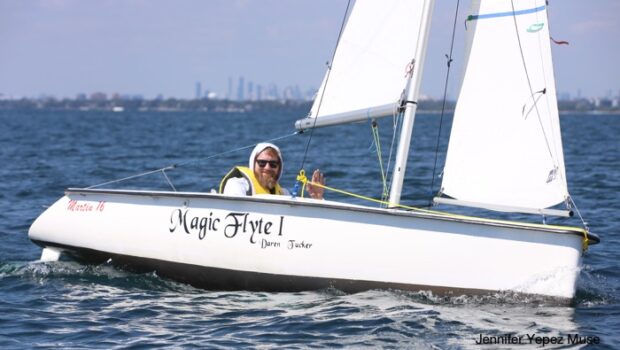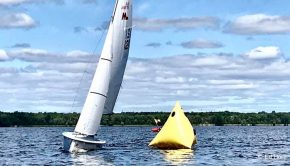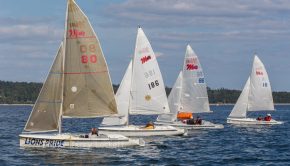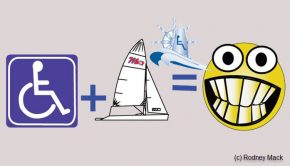The possibilities at the Mobility Cup
Published on August 31st, 2023
The Mobility Cup regatta has helped establish sailing clubs across country for people with physical, neurological disabilities. Sailors with disabilities came from across Canada to compete in 2023 Mobility Cup held August 27-31 at National Yacht Club in Toronto.
Mobility Cup is a “regatta of possibility” where personal, social, geographic, technological and organizational barriers are challenged in the spirit of friendly competition. It is international in scope, inviting people from around the globe to participate, for the purpose of excellence, discovery and learning.
The purpose of the Mobility Cup Regatta is to demonstrate that sailing is an inclusive, accessible and integrated sport or recreation available to all persons. The credo is that anyone can sail independently regardless of his or her physical ability or disability.
Mobility Cup is a major event. The exposure and fundraising provides a great opportunity for the host committee to leave a legacy of funds, capital equipment, accessible facilities and programs that will have a positive impact for years to come.
Mobility Cup is an event the competitors never forget. Every year, participants meet old friends made at previous events as well as new acquaintances. The regatta is governed by the AbleSail Network of Canada (ASN) who determines where the event will be held each year and oversees policies and procedures.
Sailors are divided into two fleets; Gold fleet for more experienced racers and the Silver fleet for newbies and those who are still honing their racing skills. The boat used for the regatta is the Martin 16, a sailboat specially designed for sailors with disabilities.
Linda Clarke has lived with the neurodegenerative disease ALS for 12 years, taking away most of her muscle function and ability to speak. But on the water, she’s the same sailor she’s been for 33 years. “It’s freeing to get out on the water and leave my wheelchair behind,” Clarke said, using a device that turns text to audio. She competed in Mobility Cup 2023 this week.
Competitors use Martin-16 vessels, which organizers say are specifically designed for people with physical disabilities. An adapted joystick tiller helps sailors steer the vessel, while electronic buttons that multiply hand strength allow them to control the sails. The adapted boats also have heavier keels to give them more stability and prevent tipping.
Clarke, along with some of the other sailors, also have a coach accompany them while they sail. “Mobility Cup brings like-minded people together. We know how to have fun, but we are really competitive,” added Clarke, who raced against 17 other boats in the event.
The annual competition has been around since the early 1990s, but organizers say it’s grown in recent years and led to an explosion of sailing clubs across Canada that equip sailors with disabilities.
Karen-Ann Xavier, principal administrator for Able Sail Toronto, the city’s local club for adaptive sailing, says there are 17 such clubs across the country, with growth happening especially in the Maritimes. The beauty of Mobility Cup, she added, is that it brings all those clubs together.
“People look forward to it every year, going to Mobility Cup,” said Xavier. “They’re meeting friends that they see once a year.” She says the event is made possible by its 110 volunteers, some of whom travel a long way just to help out. “It’s like one big happy family,” said Xavier. Next year’s Mobility Cup will be held in Nova Scotia.
Robert Muzzy has cerebral palsy, but gets in and out of his boat using a harness attached to the dock. He says that’s allowed him to spend lots of time on the water while the weather is hot. Muzzy has a short commute to National Yacht Club, where Able Sail Toronto is located, but others have come a long way to compete this week.
One of them is Hayley Redmond, who lives in St. John’s, but said that she never misses Mobility Cup. “It makes it very exciting for us, just to let go of the chair, forget your worries, focus on the water and make your goal,” said Redmond, who also has cerebral palsy. “It’s just freedom.”
Tracy Schmidt, a quadruple amputee who says she was born without any fully formed limbs, says she loves sailing in Mobility Cup, but also competes against able-bodied sailors. “The beauty of sailing is that it’s a level playing field,” said Schmidt. “It’s so enabling.”
Known as Unstoppable Tracy, Schmidt is also a motivational speaker who won a bronze medal in para-alpine skiing. She says learning how to sail as a disabled person provides confidence in other walks of life.
Schmidt uses the one finger she has on her right hand to control her boat, but “sip-and-puff” technology is allowing those with no control of their arms or legs to operate a boat. Sailors use a tube with their mouth, which turns the rudder one way by sucking in and the other way by blowing out. Biting on a switch changes that function to sheeting the sails in or out.
Danny McCoy, who was paralyzed from the waist down in 1994 but went on to found Disabled Sailing Association of Ontario in 1998 and compete for Canada in the 2000 Paralympics says the technology is “game-changing.”
Adaptive sailing has come so far, he says, and is making racing both possible and exciting for disabled sailors. “It’s just great fun, great camaraderie. If you want to race, you can race the able-bodied guys and still beat them.”
Event Details – Results – Facebook
Source: Event media









 We’ll keep your information safe.
We’ll keep your information safe.